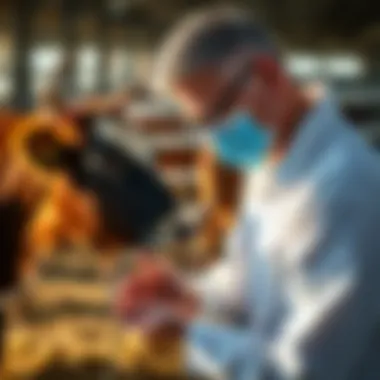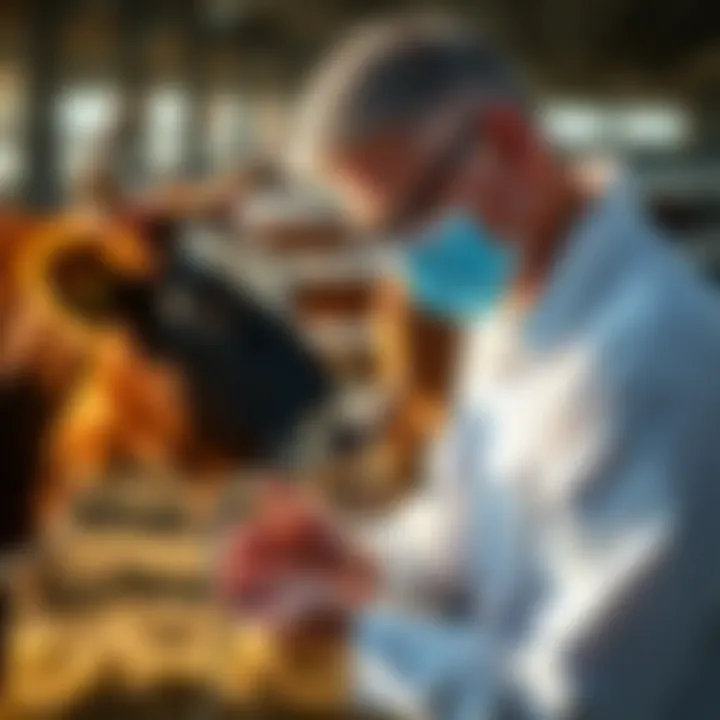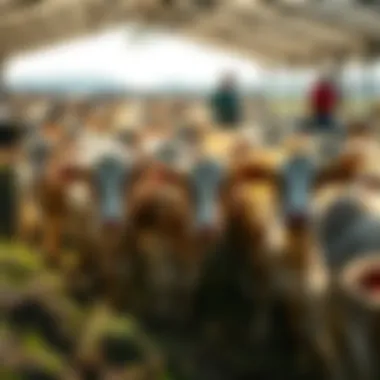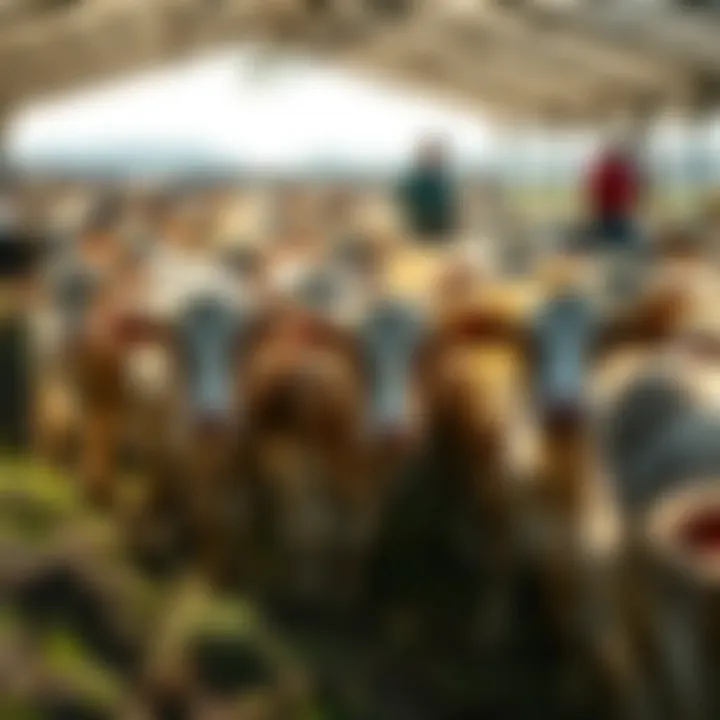Career Paths in Livestock Management Explained


Intro
The world of livestock management is like a vast, rolling landscape filled with potential and challenges. The sector is not just about the animals; it's about navigating the intricate ecosystems that surround them. With agriculture coupling itself tightly with various ethical considerations, one can genuinely find excitement and purpose in this field. The careers available within livestock management are diverse, ranging from hands-on work with animals to high-level management roles. Every path takes you deeper into the science, art, and administration of livestock farming as a critical facet of modern agriculture.
As we turn the first page in this exploration, it's important to familiarize ourselves with some of the key concepts and terminology that paint the picture of livestock management. Understanding these foundational elements is crucial for anyone hoping to make their mark in the industry.
Key Concepts and Terminology
Basic Definitions
To kick things off, let’s bind some terms:
- Livestock Management: The process of overseeing and ensuring the health, welfare, and production of farm animals such as cattle, pigs, sheep, and poultry. This includes everything from breeding and feeding to marketing and compliance with regulations.
- Animal Husbandry: A broader term often used interchangeably with livestock management, it focuses on the care, breeding, and economics of domesticated animals while considering their welfare and sustainability.
- Sustainability: In livestock management, this refers to practices that meet the needs of the present without compromising the ability of future generations to meet their own needs, particularly concerning environmental and ethical responsibilities.
Historical Context
History provides a fascinating backdrop for the evolution of livestock management. Agriculture can be traced back thousands of years, where ancient civilizations first domesticated animals for food, labor, and companionship. Over time, different approaches emerged:
- The traditional methods relied on natural breeding techniques, local feeding, and seasonal practices.
- With the rise of the Agricultural Revolution, scientific insights transformed livestock breeding, enhancing production through select genetic traits.
- In the 20th century, industrial practices took off, leading to factory farming. However, concerns over animal welfare and environmental impact have since prompted a renaissance in sustainable practices.
Recent Innovations and Trends
Technological Advancements
The landscape of livestock management is undergoing a major overhaul due to technology. Smart farming solutions, satellite tracking, and data analytics tools offer unprecedented ways to optimize operations.
Some significant advancements include:
- Wearable Technology: Devices that monitor animal health and behavior can alert farmers to potential issues before they escalate.
- Precision Feeding: Utilizing big data to tailor diets that enhance productivity, improving overall health while minimizing waste.
- Drones: Aerial perspectives that facilitate land management, enabling better planning and monitoring of livestock grazing patterns.
Sustainable Practices
The trend towards sustainability is not just a fleeting buzzword; it is reshaping the entire industry. Farmers now increasingly embrace techniques designed to minimize environmental impact. Some key aspects include:
- Rotational Grazing: Moving livestock between pastures to allow for regrowth and soil restoration.
- Integrated Pest Management: Reducing reliance on chemical control options by utilizing natural predators and habitat management.
- Carbon Footprinting: Understanding and reducing greenhouse gas emissions associated with livestock production.
"The future of livestock management relies on a harmonious blend of tradition and technology, cultivating a sustainable pathway for generations to come."
Practical Applications and Techniques
Step-by-step Guides
Moving forward, navigating the various career opportunities within livestock management involves understanding practical applications of knowledge. Consider this:
- Skill Development: Start by gaining hands-on experience through internships or entry-level positions.
- Networking: Join professional organizations such as the National Cattlemen's Beef Association.
- Continuous Learning: Stay updated with research, attend workshops, and participate in leading conferences.
Case Studies
Examining real-world applications can offer vital insights. For instance, several farms in the Midwest have adopted precision agriculture techniques to drive success. By analyzing their productivity and animal health outcomes, other farmers can learn valuable lessons on efficiency and sustainability.
For further reading on sustainable agriculture and livestock management, consider visiting resources like Wikipedia or Britannica.
Also, be sure to check community discussions on platforms like Reddit for insights from fellow agricultural enthusiasts.
Prelude to Livestock Management
Livestock management is a critical component of modern agriculture, inherently intertwined with the economic and social fabric of rural communities. By focusing on the care, breeding, and overall management of farm animals, this sector not only contributes to food production but also plays a vital role in sustaining livelihoods. Understanding livestock management is crucial for anyone looking to engage in the agricultural sector, whether they are farmers, investors, or policymakers.
The significance of livestock in agriculture cannot be overstated. It’s not merely about raising animals for meat, milk, or eggs. It’s a systematic approach that encompasses animal husbandry practices, health care, and even integrating technology into traditional farming methods. Livestock management helps in achieving higher productivity, improving animal welfare, and ensuring compliance with ever-evolving food safety regulations.
Moreover, as consumers increasingly prioritize sustainable and ethically-raised animal products, there is heightened awareness and understanding required in the livestock domain. Farmers and managers must now consider animal welfare, ecological impacts, and economic sustainability when making decisions in their operations. The blend of these considerations is what makes livestock management so intriguing and crucial.
"The livestock sector is not just an economic activity; it's a way of life that ties in culture, tradition, and community welfare."
Navigating the complexities of livestock management involves understanding the myriad of roles within this field. From veterinarians and animal nutritionists to farm managers and food safety inspectors, each position contributes to a holistic approach to animal agriculture.
This article aims to shed light on various career opportunities in livestock management, delineate the essential skills required, illustrate educational pathways, and tackle the challenges that come along with it. Armed with this information, enthusiastic farmers and prospective professionals will be better equipped to make informed decisions and foster a successful career in livestock management.
Types of Livestock Careers


In the vast realm of livestock management, there exists a plethora of career options, each offering its unique contributions to agriculture and animal welfare. Understanding the types of livestock careers is essential not just for prospective professionals, but also for those who wish to support this critical industry. The agricultural sector relies heavily on livestock for food production, natural fiber, and even companionship. Therefore, a wide range of careers not only drives economic growth but also ensures sustainable practices within livestock management.
Key aspects to consider when exploring livestock careers include the variety of roles available, the responsibilities each entails, and the skills needed to succeed in such positions. Careers can span from hands-on farm management to specialized veterinary fields and roles focused on food safety. The diversity allows individuals with varied interests and aptitudes to find a niche that suits them.
Furthermore, as consumer preferences evolve and the push for more sustainable farming practices increases, new opportunities arise, making this sector dynamic and adaptable. Each of these career paths contributes significantly to the overall success of livestock operations, and they often interact, creating a web of collaboration across the industry.
Farm Management Roles
Farm management is at the heart of livestock operations. Those who pursue roles in this area oversee day-to-day activities, from budget management to staff supervision. Effective farm managers need a solid knowledge of agricultural practices coupled with business acumen. They are often responsible for decisions that directly impact the productivity and sustainability of the farm.
A successful farm manager often wears many hats, such as:
- Resource allocation: Making choices on feed, equipment, and labor.
- Financial planning: Monitoring income and expenses to ensure profitability.
- Animal welfare: Enforcing best practices for animal care.
Managing a livestock farm requires keeping an eye on market trends and regulatory changes as well. In today's climate of volatility, it’s essential to remain informed about shifting legislation and evolving consumer demands.
Veterinary Medicine and Animal Health
Veterinarians specializing in livestock play a crucial role in maintaining the health and productivity of farm animals. They provide routine care and emergency services, becoming trusted partners for farmers.
The job encompasses:
- Diagnosis and treatment: Identifying health issues ranging from infections to complex diseases.
- Preventative care: Developing vaccinations and check-ups to prevent outbreaks.
- Consultation: Advising farm owners on best health practices and herd management.
Being a veterinary professional in this field often requires a Doctor of Veterinary Medicine degree, followed by experience in farm animal care. The importance of this role extends beyond the animals; healthy livestock lead to quality products, which in turn affects agricultural economics.
Livestock Production and Breeding Specialists
Specialists in livestock production focus on enhancing breed quality, optimizing growth rates, and developing healthier breeds. This career path often requires significant knowledge in genetics and animal husbandry practices.
These specialists are involved in:
- Herd selection: Choosing the right animals for breeding to improve desirable traits.
- Genetic evaluation: Analyzing and applying genetic principles to enhance productivity.
- Record keeping: Maintaining comprehensive records to analyze the success of breeding strategies.
Those in this niche must also keep current with technological advancements and methodologies that improve livestock production. The push for sustainability in breeding practices makes this career not only vital for productivity but also for ecological balance.
Food Safety and Quality Assurance Careers
With heightened awareness around food safety, careers focused on ensuring the quality of livestock products have gained importance. Professionals in this field monitor and implement regulations to ensure that food products meet safety standards.
Key responsibilities often include:
- Quality control inspections: Assessing meat and dairy products for contaminants or quality issues.
- Regulatory compliance: Ensuring adherence to local and national food safety laws.
- Training: Teaching livestock handlers about safe practices during production and processing.
These specialists contribute significantly to consumer confidence, safeguarding public health while supporting a vital sector of the agricultural economy. As the industry faces ongoing scrutiny, careers in food safety and quality assurance will continue to grow and evolve.
Each of these career paths offers unique contributions to livestock management, presenting a blend of responsibility, impact, and opportunity for those committed to the agricultural profession.
Educational Paths in Livestock Management
When it comes to the field of livestock management, having the right educational background can make a significant difference. It’s not just about what you know, but how you have learned that knowledge effectively. As the livestock sector evolves with new practices, technologies, and consumer expectations, solid educational paths are essential in preparing future professionals. Understanding diverse options available aids individuals in pinpointing the direction that aligns best with their career aspirations, whether they are looking to manage a farm or work in veterinary fields. This section covers various educational pathways, touching upon degrees, certifications, and ongoing learning opportunities crucial for a successful career in livestock management.
Relevant Degree Programs
Pursuing a degree relevant to livestock management can unlock doors to various opportunities across the industry. Programs often include agriculture science, animal husbandry, veterinary technology, and agribusiness. Each has its own focus, enabling students to develop specialized skills:
- Bachelor’s Degree in Animal Science: This degree dives into animal biology, nutrition, and physiology, equipping graduates with the knowledge necessary for effective animal care and farm management.
- Degree in Agricultural Management: Students here learn about the business side of farming, financial management, and production strategies, preparing them for roles that blend agricultural practices with management skills.
- Veterinary Medicine: While this is more specialized, a Doctor of Veterinary Medicine degree offers in-depth knowledge that’s critical for those interested in animal health and welfare.
- Associate Degrees: For those looking to enter the field more quickly, there are shorter programs focusing on practical skills in animal care or livestock production, putting individuals closer to the workforce sooner.
These educational routes not only build a foundational understanding but also enhance critical thinking and problem-solving skills—traits that are highly valued in livestock careers.
Certifications in Animal Sciences
In addition to formal degree programs, obtaining certifications can be a wise move for aspiring livestock professionals. These often demonstrate a specific skill set or knowledge area, appealing to employers. Some of the noteworthy certifications include:
- Certified Livestock Producer: This certification shows a mastery of sustainable practices and animal welfare standards in livestock production.
- Nursing Certification for Veterinary Technologists: This credential complements veterinary studies, allowing professionals to handle preventive care and emergency situations in animal health.
- Certifications in Food Safety: With ever-increasing consumer concerns about food safety, certifications that focus on handling and processing meat, dairy, and other livestock products are invaluable in today’s job market.
These credentials can serve as a handy tool when applying for positions, enhancing one's profile by showcasing a commitment to keeping current with industry standards.
Continuing Education and Workshops
As with many fields, livestock management is continually evolving, making lifelong learning essential. Continuing education helps professionals stay competitive. Workshops, seminars, and conferences are just a few options available for ongoing education:


- Workshops on Sustainable Farming Practices: These provide hands-on experience and insight into cutting-edge methods in livestock management that promote environmental stewardship.
- Technical Training Sessions: These may focus on the latest veterinary technologies or breeding techniques, enabling professionals to enhance their technical expertise.
Moreover, many organizations offer online courses which can be a flexible solution for those balancing work and learning. Engaging in these continuing education opportunities fosters not only personal growth but also better outcomes in farm productivity, animal health, and overall management practices.
"The field of livestock management is multifaceted. One's education should reflect the diversity of roles within, from animal care to business management."
In summary, understanding the various educational paths available in livestock management is vital for anyone looking to thrive in this industry. These paths ensure that professionals develop a combination of technical knowledge, practical skills, and ethical considerations, ultimately leading to a fulfilling career.
Skills Required for Success in Livestock Management
In the realm of livestock management, the skills one wields can often make or break a career. It's not all about knowing the ins and outs of animal husbandry or keeping up with market trends; it's about blending practical knowledge with critical thinking and social skills. The underlying elements of success in this field are diverse, with each facet contributing to a holistic understanding of livestock operations.
Technical Skills and Knowledge
Having a solid grasp of technical skills and knowledge is non-negotiable in livestock management. This goes beyond basic animal care; it encompasses understanding genetics, nutrition, breeding, and health management. Knowledge in these areas allows livestock managers to effectively increase productivity and enhance animal welfare.
For instance, a manager well-versed in livestock nutrition can tailor feeding programs that not only keep animals healthy but also optimize growth rates. Moreover, familiarity with breeding technologies, such as artificial insemination techniques, can elevate a breeding program significantly.
In addition, technological literacy is becoming increasingly important. Utilizing software for tracking herd health or managing breeding schedules is a common practice now. Many producers use data from these systems to make informed decisions. Hence, an understanding of animal science coupled with the ability to use modern management tools can lead to better outcomes, making technical proficiency a cornerstone of a successful career.
Critical Thinking and Problem Solving
Critical thinking and problem-solving skills are equally vital. The livestock industry is fraught with challenges, from disease outbreaks to fluctuating market prices. Managers must be able to analyze situations and weigh options quickly, especially when facing urgent issues like an outbreak of illness among livestock.
Take, for instance, a scenario where an unexpected illness arises in the herd. A successful livestock manager spots symptoms early, assesses potential causes, and devises a strategy to control the situation. This might involve consulting with a veterinarian, adjusting management practices, or opting for vaccinations. Such reactions not only boost the health of the animals but also protect the farm's bottom line.
Managers should also be prepared for market fluctuations. When prices drop unexpectedly, it demands immediate re-evaluation of marketing strategies, cost control, and resource allocation. The ability to pivot quickly can not only save operations but could also position them advantageously for future success.
Communication and Team Collaboration
Effective communication and teamwork can’t take a back seat in the livestock sector. Whether dealing with farm staff, veterinarians, or suppliers, a livestock manager’s ability to convey ideas and share information is crucial.
Consider the diverse tasks on a farm—one day might involve working closely with veterinary teams for animal health inspections, while another day may be about liaising with feed suppliers to secure the best rates. Strong communication skills ensure that all parties are aligned and working towards common goals, minimizing miscommunication and errors.
Additionally, fostering an environment of collaboration can lead to innovative problem-solving. For instance, regular team meetings can help bring up diverse perspectives on farm management strategies, ultimately leading to a more robust operational framework. This is particularly true in livestock management, where practical experience and insights from various team members can inform better decision-making.
Investing in honing these skills not only paves the way for personal growth but also contributes to the overall success of livestock operations. Remember, a thriving livestock system is as much about people as it is about animals.
In summary, the intersection of technical acumen, critical thinking, and effective communication forms a robust foundation for anyone looking to excel in livestock management. As this industry continues to evolve, these competencies will play an increasingly prominent role in shaping effective livestock management strategies.
Trends Shaping the Livestock Industry
Understanding the trends within the livestock industry is crucial for anyone looking to forge a successful career in this domain. As the landscape evolves, so does the demand for innovative approaches to livestock management, engaging not only many professionals but also enthusiasts in sustainable practices and technological adaptations. Whether it’s the shifting consumer behavior or advancements in farming practices, recognizing these trends can set a solid foundation for future opportunities.
Sustainable Practices in Livestock Farming
Sustainability isn't just a buzzword; it's becoming the backbone of modern livestock farming. As stakeholders increasingly prioritize environmental stewardship, sustainable practices are molding the way farms operate. For instance, methods such as rotational grazing are gaining traction, enhancing soil health while minimizing overgrazing.
Benefits of Sustainable Practices
- Environmental Impact: Livestock farms that embrace sustainable practices often find they reduce their carbon footprint, which is increasingly important to consumers.
- Economic Viability: Integrating sustainable methods can lead to long-term cost savings through resource efficiencies such as water usage reduction and feed management, contributing positively to profit margins over time.
- Market Appeal: Farmers who adopt sustainable practices can also market their products as environmentally friendly, appealing to a growing demographic of eco-conscious consumers, giving them a competitive edge.
With increasing regulations on animal welfare and environmental impact, sustainable livestock farming practices are not just advantageous but increasingly becoming indispensable.
Technological Innovations and Automation
Technology is revolutionizing livestock management, making operations more efficient and transparent. Innovations like precision farming tools, data analytics, and automated feeding systems are stepping into the limelight, proving to be game changers in livestock production.
Key Innovations:
- GPS and Satellite Imaging: Used for tracking and managing land use, enabling farmers to optimize pasture and crop yields based on real-time data.
- Smart Sensors and IoT: These technologies offer the ability to monitor livestock health and environment continuously. Issues can be addressed quickly, minimizing animal stress and loss.
- Robotics and Automation: Automated milking machines and feeding systems streamline daily operations, allowing farmers more time to focus on strategic decision-making.
Adopting these technologies creates a dual advantage: improving animal welfare and streamlining operational costs. For those willing to engage with these innovations, expanded career pathways are more than just a possibility; they become a reality.
Changing Consumer Preferences
As consumer tastes evolve, the livestock industry faces mounting pressure to adapt. The demand for ethically sourced and high-quality meat, dairy, and eggs is soaring. More consumers are asking where their food comes from and how it was produced. This change in mindset calls for livestock producers to be more transparent about their methods.
Consumer Demands:
- Quality over Quantity: Shoppers are increasingly prioritizing quality products over cheaper alternatives. Livestock managers are thus compelled to meet higher standards of care and husbandry.
- Ethical Practices: With growing concerns around animal welfare, consumers want assurance that livestock is treated humanely, requiring farmers to adapt their operational standards accordingly.
- Local Sourcing: There is also a strong preference for locally sourced products, encouraging farmers to tap into local markets effectively. This localism allows for fresher products and smarter logistics.


In summary, keeping an ear to the ground about these consumer shifts is valuable for anyone involved in livestock management. The success or failure of a business may well hinge on its ability to respond aptly to these trends.
Challenges in Livestock Management Careers
In the ever-evolving landscape of livestock management, professionals face a slew of challenges that can make or break their careers. Understanding these hurdles is vital for anyone considering a path in this industry. Far from a sleepy backwater of agriculture, livestock management is a dynamic field fraught with complexities. These challenges—be it animal welfare concerns, economic fluctuations, or regulatory compliance—demand not just skills but resilience and adaptability.
Each of the issues presented here is interrelated, creating an environment where livestock managers need to be well-rounded individuals. As the industry grapples with public scrutiny over animal welfare, market pressures, and an intricate web of regulations, aspiring professionals must be equipped to navigate this treacherous terrain.
"Those who are aware of the challenges in livestock management will be better positioned to excel in their careers and advocate for sustainable practices."
Animal Welfare Concerns
Animal welfare is becoming increasingly important in the livestock industry. The rise of consumer awareness, along with the influence of social media, has put immense pressure on livestock managers to ensure that animals are treated humanely and ethically. This is not just a moral obligation; it directly affects a farm's reputation and the bottom line.
Ensuring optimal living conditions, adequate space, and humane treatment can be resource-intensive. Livestock managers might find themselves torn between operational efficiencies and ethical practices. Additionally, the backlash from poorly managed animal welfare practices can come swift and hard, leading to loss of business and even legal repercussions.
Examples of how this issue plays out in real life include cases where farms have faced public outcry over substandard living conditions or mistreatment of animals. Such incidents can tarnish reputations built over years; hence, understanding animal welfare policies and best practices is crucial.
Economic Pressures and Market Fluctuations
A day in livestock management can feel like riding a rollercoaster, where economic fluctuations are the dips and turns. The livestock market is influenced by various factors—feed prices, supply and demand, trade policies, and consumer trends. With the sky-high costs of feed supplies and ever-changing market conditions, staying profitable is no small task.
Livestock managers also need to be adept at financial planning. A sudden drop in demand can hit hard, leading to overstocked inventories and reduced revenues. Additionally, when market prices for meat, dairy, or eggs fluctuate wildly, it can severely impact operational budgets, leading to tough decisions about resource allocation and staffing.
- Have a contingency plan in place for market downturns.
- Track trends to adapt to consumer preferences.
- Foster relationships with local suppliers to mitigate costs.
By proactively monitoring economic trends, managers can pivot quicker, reducing the impact of unfavorable market conditions.
Regulatory Compliance and Risks
The livestock sector is one of the most regulated industries in agriculture. From animal health and safety protocols to environmental regulations, compliance is key. Understanding these laws isn't just a bureaucratic box to tick; it's a matter of operational integrity and public trust.
Failure to adhere to regulations can lead to substantial penalties and sanctions, not to mention the potential damage to a farm’s reputation. Livestock managers must stay informed about changing regulations that can affect everything from the use of antibiotics to waste disposal.
- Regularly attend workshops or training sessions on current regulations.
- Establish clear documentation protocols for compliance.
- Create an emergency response plan for regulatory inspections.
Understanding the legal landscape can spell the difference between smooth operations and costly missteps. As such, navigating this thicket of rules is both a challenge and an essential skill in any livestock management career.
The Future of Livestock Careers
As the world continuously evolves, so too does the landscape of livestock management. Today, career opportunities in this field are not just growing; they are diversifying significantly. With an increasing focus on sustainability, technological advancements, and changing consumer preferences, the future looks vibrant for those looking to enter this sector. Understanding these dynamics is crucial, especially for individuals aiming to carve out a niche in this field.
Emerging Opportunities and Fields
In the world of livestock management, new doors are swinging wide open. These aren’t just your traditional roles either; they encompass a range of emerging areas that intertwine livestock management with other progressive fields.
- Sustainable Animal Husbandry: As more farmers prioritize sustainability, professionals knowledgeable in eco-friendly practices will become highly sought after. This includes implementing regenerative farming practices that increase soil health and animal welfare.
- Technology Integration: The use of artificial intelligence, drones, and automation in livestock monitoring is on the rise. Data analysts with expertise in livestock management software will have an edge, helping farmers make data-driven decisions.
- Meat Alternatives: The surge in plant-based diets has sparked interest in careers that focus on developing meat substitutes, examining how these alternatives can complement traditional livestock farming.
- Animal Nutrition and Welfare: With a growing emphasis on animal rights, specialists who can develop better feed and husbandry practices to enhance animal welfare are becoming indispensable.
Each of these fields presents unique challenges and opportunities that can lead to a fulfilling career while promoting responsible practices in agriculture. Those curious to learn more should explore insights from industry reports and resources like National Agricultural Statistics Service for data trends.
Career Growth and Development Paths
When considering a career in livestock management, understanding the potential for advancement is key. The pathways to growth can be both fulfilling and varied:
- Starting from the Ground Up: Many enter the field as farmhands or through internships. With hands-on experience, individuals can quickly rise to supervisory roles.
- Professional Development: Pursuing further education or certifications can open doors to specialized positions, such as livestock nutritionists or animal behaviorists. Continued education through institutions offering programs in animal sciences can give applicants an edge.
- Networking and Industry Engagement: Joining organizations related to livestock management, such as the American Society of Animal Science, can provide connections and resources invaluable for career advancement. Networking opportunities offered through industry conferences can lead to collaborations and job opportunities.
These pathways exemplify how proactive engagement in one’s career can lead to both personal and professional growth. Indeed, those who remain adaptable and well-informed will find myriad ways to thrive in this evolving industry.
"The only limit to our realization of tomorrow will be our doubts of today."
As the livestock management sector embraces advancement and shifts in consumer behavior, the potential for dynamic and fulfilling careers remains considerable. The onus is now on aspiring professionals to seize these opportunities and contribute to a promising future in livestock management.
Ending
In concluding this exploration of careers in livestock management, it's crucial to recognize the profound impact this field has not only on individuals but also on the larger tapestry of agriculture. Livestock management is much more than overseeing animals; it involves a complex interplay of science, economics, and ethics, all wrapped up in a daily routine that many don’t fully appreciate.
Summary of Key Points
In this article, we outlined various career pathways, showcasing options from farm management to veterinary roles and food safety careers. Each role demands a unique skill set that contributes to the overall health of the livestock industry. We also highlighted emerging trends that influence future career opportunities, such as sustainability efforts and technological advancements.
- Livestock management incorporates both practical and theoretical knowledge.
- Evolving consumer preferences shape related career opportunities.
- Effective communication and collaboration are vital for success in the field.
- Challenges such as market fluctuations and animal welfare are ongoing considerations.
"In livestock management, it’s essential to be adaptable, as both the market and the animals themselves can be unpredictable."
Final Thoughts on Pursuing a Career in Livestock Management
As you consider a career in livestock management, weigh the benefits against the challenges. The field is rewarding and offers a chance to have a significant impact on food systems, animal welfare, and sustainable farming practices. Those who forge a career here do more than just work; they contribute to the broader conversation about our food systems and the environment.
Aspiring professionals must remain informed and engaged with industry developments. This can be achieved through continuing education and networking within the community. The path may not always be easy, but it is filled with opportunities for growth and contribution.
With dedication and the right skill set, a career in livestock management can be both fulfilling and instrumental in advancing agricultural practices. Recognizing the essential role livestock plays in our economy and environment can pave the way for thoughtful and impactful careers.















